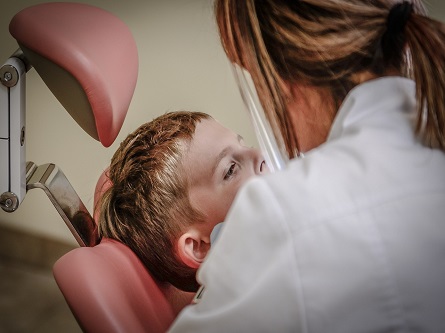What Parents Should Know Before Their Child’s First Dental Visit
 The first dental visit is a milestone in a child’s development for oral health and setting a foundation of comfort and confidence in future dental care. Many parents may feel uncertain about what to expect, how to prepare their child, and what a first appointment involves. Early dental visits aren’t just about checking for cavities—they are about prevention, education, and establishing trust. Ensuring your child has a positive experience can influence their attitudes toward dental health for years. We will explore essential things every parent should know before taking their child to the dentist for the first time.
The first dental visit is a milestone in a child’s development for oral health and setting a foundation of comfort and confidence in future dental care. Many parents may feel uncertain about what to expect, how to prepare their child, and what a first appointment involves. Early dental visits aren’t just about checking for cavities—they are about prevention, education, and establishing trust. Ensuring your child has a positive experience can influence their attitudes toward dental health for years. We will explore essential things every parent should know before taking their child to the dentist for the first time.
Preparing for the First Visit: Tips Every Parent Should Consider
Know the Right Timing for the First Appointment
The American Academy of Pediatric Dentistry recommends that children visit the dentist by their first birthday or within six months of their first tooth erupting—whichever comes first. Many parents are surprised by how early this is, but the rationale is simple: preventive care begins before problems arise. Waiting until a child is three or four can allow minor issues to progress into more serious concerns.
These early appointments give the dentist a chance to examine the developing teeth and gums and help parents understand how to clean baby teeth, manage feeding habits, and avoid common risks like baby bottle tooth decay. Visiting a trusted provider like Stoney Creek Dental Practice during this stage ensures that families receive personalized guidance and reassurance. The first visit also creates a baseline for future care and establishes a positive relationship between the child and their dental provider.
Create a Positive Expectation Ahead of Time
One of the most important things parents can do is frame the dental visit as a fun and exciting experience. Children absorb emotions from the adults around them. If a parent is visibly anxious or talks about the dentist fearfully, the child may mimic those feelings. Use simple and cheerful language to describe the upcoming visit, such as “The dentist will count your teeth and ensure they’re healthy!” Many age-appropriate books and videos show children what to expect, often with friendly cartoon characters going to the dentist for the first time. Practicing at home with a toothbrush and a pretend “check-up” can also help make the real visit feel familiar and less intimidating.
Understand What Will Happen at the Appointment
Knowing the structure of the first dental appointment can help parents prepare themselves and their child. The first visit is typically short and focuses on examination, education, and comfort rather than treatment. The dentist may gently inspect the teeth, gums, jaw, and bite to check for development and any signs of concern. Depending on the child’s age and cooperation, the dental team might clean the teeth and apply a fluoride treatment. Parents are often invited to sit with their child or hold them during the visit, which can provide comfort. In addition to the examination, the dentist will discuss oral hygiene techniques, thumb-sucking, teething, and dietary habits. These conversations are valuable for creating a plan tailored to your child’s needs and routine.
Bring the Right Things to the Appointment
A little preparation goes a long way in ensuring a smooth dental visit. Bring any necessary insurance information, identification, and questions or concerns you want to address. If your child uses a pacifier or bottle or has specific oral habits, mention them to the dental team. Comfort items such as a favorite toy or blanket can also help in unfamiliar surroundings. If the child is old enough, let them choose the toy themselves so they feel in control. Arriving a few minutes early can allow your child time to adjust to the environment and explore the waiting area. Avoid scheduling the visit during nap time or right before meals, as a tired or hungry child is likelier to be irritable or uncooperative. The goal is to set the stage for a calm and positive experience from the moment you walk in.
Follow Up with Positive Reinforcement at Home
What happens after the appointment is as important as what happens during it. Reinforce the idea that visiting the dentist is a positive and normal part of growing up. Celebrate your child’s cooperation with praise, a small reward, or a fun activity afterward. Avoid using food treats as rewards, since this can send mixed messages about oral health. Continue encouragingly talking about dental care and enthusiastically incorporating brushing and flossing into the daily routine. Make oral care something your child looks forward to by using fun toothbrushes, tasty toothpaste, and brushing together as a family. Keep future visits on schedule—usually every six months—and remind your child when the next appointment is. Familiarity over time helps reduce fear and builds long-term trust with the dental care team.
A child’s first dental visit can shape their attitude toward oral health for the rest of their life. Parents can help make the experience smooth, educational, and enjoyable with the right timing, preparation, and follow-up. From setting expectations to knowing what to bring, each step reduces anxiety and fosters confidence. Early appointments prevent potential problems and encourage lifelong habits that support healthy teeth and gums. By guiding your child through this milestone with patience and positivity, you’re setting the stage for a future filled with bright smiles and healthy routines.